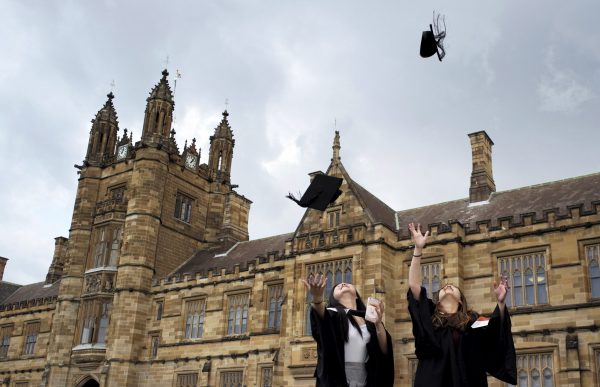There are clear opportunities here for Australian research and development collaboration as well as even greater opportunities for Chinese and Australian students in the future.
In international education from schools to universities, the number of Chinese students studying in Australia rose this year to almost 170,000, which accounts for around 29 per cent of the total international student body.
It is encouraging that Australia’s education relationship with China has become more mutual: the numbers of Australian students going to China has grown by 83 per cent since 2011. This helps to build Australia’s knowledge of Asia, at the heart of which sits China.
International engagement through education is not just good diplomatic practice. It is a major slice of the Australian economy, constituting Australia’s largest non-mineral export. Education exports have earned Australia close to US$28 billion in 2017.
Exporting education on this scale is an exceptional opportunity to build affinities across borders and cultures. It can also create a network of influence and soft power that will have substantial reach in the decades to come.
If Chinese young people return to China with positive memories of Australia, this creates a network of alumni who are ambassadors and champions for Australia. In this century, when China is so crucial to the world’s economy, security and stability, this magnifies Australia’s influence.
But international education is complex. At its heart are people making significant sacrifices and huge adjustments to seize opportunities.
Inevitably, many international students — including the large numbers in Australia right now — experience difficulties adjusting to a new societal and study environment. Some of these difficulties are about acclimatising, overcoming the language barrier and getting familiar with the culture.
Other issues are more serious, but much less common. As recent news articles and academic debates reveal, there are security concerns that may limit the central idea of a great university education: academic freedom. These include allegations of spying, monitoring of Chinese students by the Chinese embassy and by other students, infiltration of Australian society as well as harassment of families in China.
It is incumbent on Australian universities to recognise these challenges and work in partnership with government to address them.
Whatever measures Australian universities take, at the heart of their response will always be a commitment to academic freedom and making sure students are exposed to new ways of thinking. The goal is for graduates of Australian universities to be resilient, respectful and critical thinkers. That is the skill set that Chinese and other foreign students are paying to learn.
But part of acquiring intellectual maturity is rooted in belonging. This requires a campus community that is welcoming and cohesive so that the overseas student experience is not dominated by the understandable but less than desirable tendency of students from different backgrounds to ‘club together’ based on their common nationality.
Universities can encourage a more cohesive university community by creating structures and mechanisms that make it easier for international students to engage. They can provide alternatives to self-organised or government-organised activities, although former types will naturally be a part of the mix. For example, prioritising housing in residential hall offerings to a wider range of nationalities enables people from across the world to live together and experience each others’ cultures.
Of course, security concerns need to be acknowledged and addressed. This is part of ensuring that our international relationships — whether in research, teaching or student recruitment — are sustainable and in the national interest. But security issues need to be put in careful context. There is no upside to letting security concerns about a small proportion of international students affect attitudes to the wider international student body — whether from China or anywhere else. Australians must avoid the flat-out wrong idea that all Chinese students are spies, or that they are incapable of critical enquiry or that they all think alike.
Given the contribution they make and their potential role as champions and ambassadors for Australia in the years ahead, to allow negative perceptions of Chinese students to set in would be doing Australia a huge disservice.
There is a fork in the road for Australia and China — one path where the two countries work cooperatively, and one where they do not. The first leads to mutual prosperity. The second is full of risk. Working cooperatively does not mean giving up on the diligence surrounding Australia’s national security. But it does mean creating a more connected, dynamic and peaceful world, which is in Australia’s and everyone’s interests.
Brian P Schmidt is Vice-Chancellor and President of The Australian National University. This article is an edited and abridged version of the Keynote Address at the Welcoming Dinner of the Sixth National Meeting of China Matters in Canberra on 16 October 2017.
This article appeared in the most recent edition of East Asia Forum Quarterly, ‘China’s Influence’.


I suspect a lot of international students from developing countries have profoundly different world views from Western perspectives, and many or even most see China’s rise as a force for good (all things considered, acknowledging the negatives), vs the US-centric view sees China as a threat. I also suspect that many people who see China as a threat assume that international students who support China’s rise must be agents of the Chinese government. Australia’s academics, media and government must reflect on whether it is legitimate, even reasonable, for people to support China’s rise, including China’s position on (say) Taiwan, the South China Seas and the Senkaku islands.
We have to keep an open mind, acknowledge that other people may reasonably hold views and values that we do not hare, without labelling them as agents of foreign powers.